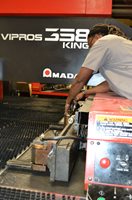There has been a lot of focus lately on changing the perception of manufacturing and eliminating the idea that it is a dirty, dark and dangerous industry to work in. These negative perceptions can create obstacles for companies trying to find and retain talent. Pamela Prah, in Selling manufacturing to a new generation, mentions how manufacturing has moved from manual mills and lathes to computerized numerical control equipment and 3-D printers. The face of manufacturing has changed drastically and its time companies started showing the industrys advancement. Shedding light to the new and innovative industry that manufacturing has become can be vital to bringing in and retaining talent; and one great way for a company to make that happen is through apprenticeship programs. In a recent Wall Street Journal article Apprenticeships Help Close the Skills Gap. So Why Are They in Decline? author Lauren Weber points out the opinion of Robert Lerman, an economics professor at American University, saying, Apprenticeships can offer a precise match between the skills employers want and the training workers receive. In 2011, Waukesha® Metal Products (WMP) hired a Tool and Die Maker Apprentice as a part of a five-year training program. The apprenticeship program combines structured job training with related instruction. The apprentice works in WMPs tool room and attends supplementary classes at Waukesha County Technical College to earn a Journeymans card after the completion of the program. Since starting the apprenticeship program in 2011, WMP has hired another tool and die maker participating in the apprenticeship program in 2012 and in 2013 an existing employee started a new Maintenance Mechanic Apprenticeship. Many companies still have their doubts about apprenticeships. Weber points out in her article that Some companies also fear that employees will leave for better-paying jobs almost as soon as theyve learned their required skills. For them, an apprenticeship amounts to training workers for other companies. Turns out, most companies are finding the opposite, employers are finding that apprenticeships actually help with retention, as workers who come up through apprenticeships see the investment their employers are making in their career and reciprocate with a greater sense of loyalty. Tyler Stewart, an employee of WMP currently going through the Maintenance Mechanic Apprenticeship, talks about his experience with the apprenticeship and why he finds it beneficial. What do you find beneficial about being in the Apprenticeship program? For me there is nothing, and I mean nothing, that I dont find beneficial about the apprenticeship program. It is a God sent opportunity I am able to go to school and still provide for my family. With the apprenticeship Im able to apply my studies directly to what Im doing at work which makes for a better work and school experience. Another great thing about this program is that as your knowledge grows, your pay does too, which I thought was a fantastic benefit of the program. Has it helped you in your career today? Truthfully, it gave me a career. Before the opportunity came up I was just working a job. I didnt know what I wanted to do. I couldnt figure out how I was going to be able to go to school and work at the same time. All I knew was work, work & Church. One thing I did know was that I didnt want to have to work three or four jobs for the rest of my life, and now that I have embarked upon this career, I wont have to! Has the apprenticeship given you a different perspective on the manufacturing industry? I would say so. I remember I used to look at the maintenance guys, the welders, the tool & die makers and think to myself, these guys must have been born with those skills, and I do still believe we all are blessed with certain abilities, but certain skills are learned and the apprenticeship program nurtures those raw skills and helps you grow and develop them into new talents. Not to sound cliché but the sky truly is the limit. Manufacturing has so many parts to it that anybody can find something that they like to do. If you like to find solutions to problems, get into maintenance. If you like seeing pieces of metal come together into a finished product that you had part in creating, get into welding. If you have thoughts on how to make other peoples lives easier by something youve created, get into tool & die making or engineering. If you are a real people person and get satisfaction from helping others get what they want, get into sales and marketing. There are so many aspects to manufacturing that any one of those aspects can be perfect for anybody. Would you recommend doing an apprenticeship program to others? Yes, I recommend this for any and every one. If this opportunity comes up in your life take it. Dont let it pass you by. It doesnt matter where youre from or what youve done in the past, this program can work for anybody, and I mean anybody. The other factors making these apprenticeships a positive approach to closing the skills gap are the schools and universities. President/CEO, Jeff Clark, of WMP believes “We [Wisconsin] have one of the best tech college systems in the country that will provide us the resources to grow the middle skills gap.” Others are also noticing the promising effects of apprenticeships in the state of Wisconsin. In her article, Weber notes that Proponents of apprenticeships argue that blending on-the-job training, related education and benchmarks can be done in any occupation. They point to programs in places like South Carolina and Wisconsin as producing encouraging results. Apprenticeship programs could be the difference for bringing in and retaining employees for companies. Through these programs, WMP is able to reach out and show others the true side of the manufacturing industry. Educating them on the opportunities available and creating a positive image is essential for the future in manufacturing. As businesses, it is our responsibility to create career pathways for our young people. Partnerships with our public schools, technical colleges, universities and community organizations are paramount to creating successful education pathways that lead to accelerated career opportunities for our youth.

